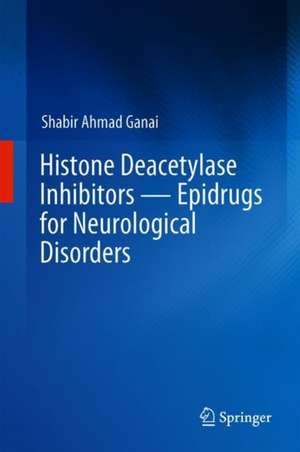Histone Deacetylase Inhibitors — Epidrugs for Neurological Disorders
Autor Shabir Ahmad Ganaien Limba Engleză Hardback – 15 iul 2019
The book explores the potential use of these inhibitors as novel therapeutic agents, considers the current challenges involved in using them to tackle neurological complications, and offers a novel solution by designing isoform-selective inhibitors and employing combinatorial therapeutic strategies. Its final section, which explores future directions, elaborates on the possibility of enhancing HDAC inhibitors’ therapeutic efficacy against various neurological complications.
| Toate formatele și edițiile | Preț | Express |
|---|---|---|
| Paperback (1) | 543.69 lei 38-44 zile | |
| Springer Nature Singapore – 15 aug 2020 | 543.69 lei 38-44 zile | |
| Hardback (1) | 636.45 lei 3-5 săpt. | |
| Springer Nature Singapore – 15 iul 2019 | 636.45 lei 3-5 săpt. |
Preț: 636.45 lei
Preț vechi: 748.76 lei
-15% Nou
Puncte Express: 955
Preț estimativ în valută:
121.80€ • 132.26$ • 102.31£
121.80€ • 132.26$ • 102.31£
Carte disponibilă
Livrare economică 01-15 aprilie
Preluare comenzi: 021 569.72.76
Specificații
ISBN-13: 9789811380181
ISBN-10: 981138018X
Pagini: 87
Ilustrații: XVII, 93 p. 8 illus., 5 illus. in color.
Dimensiuni: 155 x 235 mm
Greutate: 0.31 kg
Ediția:1st ed. 2019
Editura: Springer Nature Singapore
Colecția Springer
Locul publicării:Singapore, Singapore
ISBN-10: 981138018X
Pagini: 87
Ilustrații: XVII, 93 p. 8 illus., 5 illus. in color.
Dimensiuni: 155 x 235 mm
Greutate: 0.31 kg
Ediția:1st ed. 2019
Editura: Springer Nature Singapore
Colecția Springer
Locul publicării:Singapore, Singapore
Cuprins
Chapter 1. Role of Epigenetics in neurological diseases.- Chapter 2. Epigenetic enzymes and the drawbacks of conventional therapeutic regimens.- Chapter 3. Distinct classes of HDACs.- Chapter 4. HDAC implications in neurological diseases.- Chapter 5. HDAC inhibitors and their structurally distinct groups.- Chapter 6. HDAC inhibitors as novel therapeutic option against therapeutically challenging neurological disorders.- Chapter 7. Current Challenges with HDAC inhibitor based therapeutic intervention against neurological maladies.- Chapter 8. Escalating need of isoform selective inhibitors for enhanced therapeutic efficacy.- Chapter 9. Combinatorial therapeutic regimens using HDAC inhibitors in conjunction with conventional therapeutic agents.- Chapter 10. Future directions of epigenetic research in tackling neurological complications.
Notă biografică
Dr. Shabir Ahmad Ganai is currently working as Assistant Professor Cum Junior Scientist, Division of Basic Sciences and Humanities, Faculty of Agriculture, SKUAST-Kashmir, Wadura, Sopore, 193201, Jammu & Kashmir, India. He has done his masters in Biochemistry from Bangalore University (2005-2007) and earned his Ph.D. from elite SASTRA University (2009-2014). Later, he did his post-doctorate from National Brain Research Centre, Haryana, India. He has also served as research fellow in SKUAST-Kashmir. His research interests are focused on understanding the modulations of the nuclear geometry and post-translational modifications during treatment with structurally distinct HDAC inhibitors. He has been actively involved in designing the target-selective inhibitors against Class II HDACs using various bioinformatics tools.
Dr. Shabir Ahmad Ganai has published more than 20 research articles and one editorial in high impact factor international Journals. He has also served as guest editor for a thematic issue (Epigenetics: A novel frontier for drug discovery) published by Current Medicinal Chemistry. In addition, he serves as a referee for many reputed international journals like Current Drug Targets, PLOS ONE and Medicinal Chemistry Research. He is an active member of many national and international societies including, The International Association of Therapeutic Drug Monitoring and Clinical Toxicology (IATDMCT).
Dr. Shabir Ahmad Ganai has published more than 20 research articles and one editorial in high impact factor international Journals. He has also served as guest editor for a thematic issue (Epigenetics: A novel frontier for drug discovery) published by Current Medicinal Chemistry. In addition, he serves as a referee for many reputed international journals like Current Drug Targets, PLOS ONE and Medicinal Chemistry Research. He is an active member of many national and international societies including, The International Association of Therapeutic Drug Monitoring and Clinical Toxicology (IATDMCT).
Textul de pe ultima copertă
This book provides an outline of epigenetics as a whole, while also specifically examining a range of epigenetic players, including histone acetyl transferases (HATs) and histone deacetylases (HDACs). It chiefly focuses on the emerging targets of HDACs and their implications for various neurological disorders, while also discussing the drawbacks of current therapeutic strategies, the classification of HDAC inhibitors, and their promising effects in connection with specific neurological disorders.
The book explores the potential use of these inhibitors as novel therapeutic agents, considers the current challenges involved in using them to tackle neurological complications, and offers a novel solution by designing isoform-selective inhibitors and employing combinatorial therapeutic strategies. Its final section, which explores future directions, elaborates on the possibility of enhancing HDAC inhibitors’ therapeutic efficacy against various neurological complications.
The book explores the potential use of these inhibitors as novel therapeutic agents, considers the current challenges involved in using them to tackle neurological complications, and offers a novel solution by designing isoform-selective inhibitors and employing combinatorial therapeutic strategies. Its final section, which explores future directions, elaborates on the possibility of enhancing HDAC inhibitors’ therapeutic efficacy against various neurological complications.
Caracteristici
This book is first of its kind that summarizes the role of the 18 isoforms of Histone deacetylase (HDAC) in different neurodegenerative disorders It uniquely highlights the potential of various HDAC inhibitors as therapeutic agents against different neurological disorders It provides an updated account of the various approaches to design the selective inhibitors as targets against Classical HDACs It comprehensively enriches the understanding of the synergistic therapeutic approaches for mitigating the dose limited effects of HDAC inhibitors
